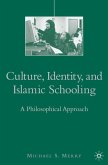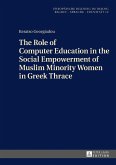After 9/11, education in the Middle East has come under increasing scrutiny. Some in the West believe education is responsible for the ideological preparation of extremists. Others think that the lack of quality education creates a pool of likely terrorists. Western demands and initiatives to reform education in the Middle East have resulted from such views and from an understanding of the development needs in the region as well. But these initiatives and demands are perceived differently in the Middle East. Middle Easterners are divided between those who view the Western initiatives favorably and those who perceive them with suspicion and even fear. This book examines the views of Yemeni educators on the need for education reform and their attitudes toward Western reform initiatives. Questions of the impact of religiosity (personal piety vs. support for political Islam), culture, and politics on their attitudes are also explored.
Bitte wählen Sie Ihr Anliegen aus.
Rechnungen
Retourenschein anfordern
Bestellstatus
Storno








